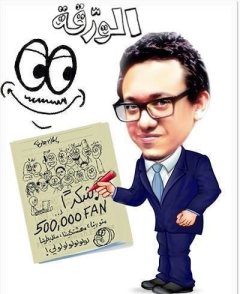“Laughter is the best therapy to overcome life problems and come to grips with mistakes.” That’s Islam Gawish’s life motto.
Gawish is a cartoonist who uses sarcasm and caricatures to criticise the negative habits and behaviours he encounters everyday in the Egyptian streets. His drawings, made on a tablet computer, are simple. But together with witty commentary, the sketches form a mirror that help Egyptians reflect on serious issues, including the flaws of our educational system, sexual harassment, bureaucracy, transportation problems, and even love and marital troubles.
Gawish, like many young cartoonists with controversial things to say, chooses to distribute his work online. On his Facebook page “El Waraka”, which has more than half million subscribers, he uses a wide range of characters – hypocrites, rebels, bullies, microbus drivers, students, historical figures – to shed light on important political and social current events, he said.
Although Gawish works as a photojournalist, graphic designer, and humourist, drawing caricature sketches remains his passion. Raised in an artistic family, he has been drawn to the arts since he was a child, he said. His grandfather and sister are visual artists and his aunt is a sculptor, so he was always surrounded with paintings and colours.
He launched “El Waraka” with his team on 20 January.
“The whole thing started when I tried to express my opinions in an innovative way,” he said.
He posted his first sketches on his personal Facebook and Twitter accounts, and they quickly spread.
“I noticed that many other pages started to publish them without mentioning my name,” he said. He launched “El Waraka” to collect the sketches and guarantee their copyrights.
His main objective is to use sarcastic and dark humour to examine Egyptian life freely without intruding bias or political affiliation. The most important quality of caricature artists, in his opinion, is to respect the audience’s feelings and mentalities, avoid attacking people unjustly, and stay away from insults and vulgar language.
“I come up with the ideas of my cartoons from reality,” he said. “Streets, houses, daily conversations and the internet are endless sources for ideas.”
Gawish believes caricature has played a crucial role in shaping public opinion since the 25 January Revolution.
“Cartoons, comics, and caricatures created another revolution on social network sites, by tackling critical public issues in a very courageous way,” he said. “We can’t deny the importance of Ahsraf Hamdy and Carlos Latuff’s drawings and how they informed and affected people.”
However, Gawish said, the traditional political satire caricature that used to be published in newspapers is on the edge of an abyss. He pointed to the government’s decision to ban Bassem Youssef’s satire programme as a sign that cartoonists and critical artists are in danger. The best satirists discuss important and serious issues in a way that appeals to large numbers of people, which often means their work is under a microscope.
“Political caricature must be presented to people in an entertaining way, as they are fed up with a heavy flow of information from the media,” he explained.
While he enjoys satirising Egypt’s problems, Gawish said his ambitions extend beyond this.
“I hope to be able to extend my message to the Arab world and Europe soon.”



